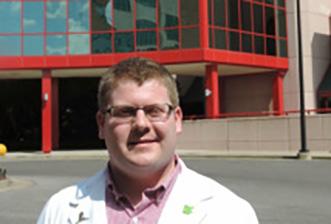Summer research experience allows student to create hope for cancer patients
Heritage College, Cleveland, student Nathan Reynolds, OMS II, gained firsthand experience in research-driven medical care this summer through the Pediatric Oncology Education Program at St. Jude Children’s Research Hospital in Memphis, Tenn.
Reynolds is one of 54 students in the country selected to take part in the program, where he worked under the guidance of Melissa Hines, M.D., a researcher and practitioner in the pediatric intensive care unit. Reynolds was part of a research team evaluating diagnostic criteria for hemophagocytic lymphohistiocyosis, a disorder of the immune system that causes the body to attack itself, causing organ failure and ultimately death, if untreated. By determining which diagnostic criteria are the best predictors of the disorder, the team hopes to increase the likelihood that future patients are diagnosed correctly in early stages.
Reynolds dreamed of a career treating cancer patients even before he started medical school. And now, thanks to his summer experiences at St. Jude, he appreciates even more fully how he can translate new research findings into hope for these patients. He also encourages other Heritage College students to take advantage of research opportunities to advance the scope and quality of health care.
Reynolds delved into his summer experiences through an interview with the college.
Why is it important for you to work with cancer patients?
I’m excited about the medical advances and research in the field of hematology and oncology, and that translates directly into my motivation for wanting to treat cancer patients. In the face of a catastrophic disease, I want to treat and help guide my future patients on their cancer journey to achieve the highest quality of life with the longest duration possible.
Who is your mentor?
My mentor was Dr. Melissa Hines, and she taught me the importance of integrating research into your clinical practice, as it helps you be a more focused and better clinician. She also taught me the importance of keeping a mentor throughout and beyond medical school. The idea of having a second set of eyes to look over a paper, or to discuss a manuscript or research proposal, is important on the continuum of a career.
Aside from your experiential learning in research and clinical treatment, what have you learned through this program?
We learned about the history and mission of the hospital; the ethics of clinical trials; the pathophysiology of hematologic and solid tumor malignancies in the pediatric population; the therapies the kids are given (chemotherapy, immunotherapy, radiation therapy, targeted therapy, surgery); the global mission of taking the research conducted at St. Jude and bringing it to developing countries; palliative care and hospice in the pediatric oncology population – as well as support services for the families; and St. Jude’s vaccine development and manufacturing operation.
What are the plans for publishing your team’s research findings?
We’re still about a month away from submitting the finalized manuscript, and it will be my first peer-reviewed article submission. I have one other publication, but it is a chapter in a textbook. Our project had two objectives: to evaluate the sensitivity and specificity of the HLH-2004 diagnostic criteria, and to create a novel scoring system based on readily available, non-invasive clinical and laboratory variables that can be used to predict an early diagnosis of HLH.
How has the Heritage College supported your efforts?
The Heritage College is doing a phenomenal job encouraging students to pursue research opportunities both within the institution and externally. The research process is integral to medicine, so having an environment that fosters that early on in our medical career will lead to more D.O.s being involved in research projects once we enter into our residencies and beyond.
Reynolds received a bachelor’s degree in biomedical sciences at Western Michigan University in 2012, before earning a master’s degree in public health from Hebrew University in Jerusalem in 2014. There, he developed skills in statistical analysis and research, which he applied through his work in the clinical trials office of the Taussig Cancer Center at Cleveland Clinic from 2015 to 2017. After working in data collection and regulation for lung, bladder and kidney cancer patients for two years, Reynolds began his medical education in 2017 at the Heritage College, Cleveland, where he recently began his second year.
